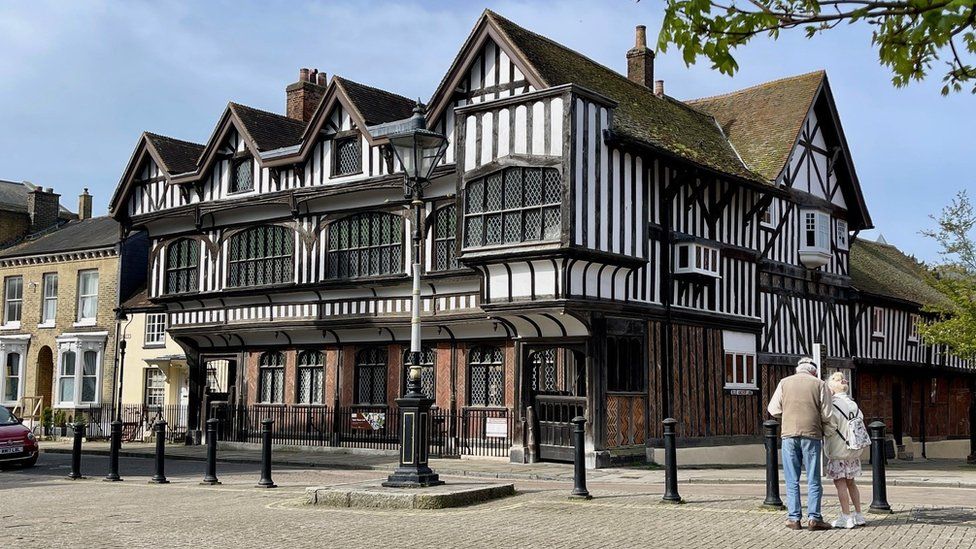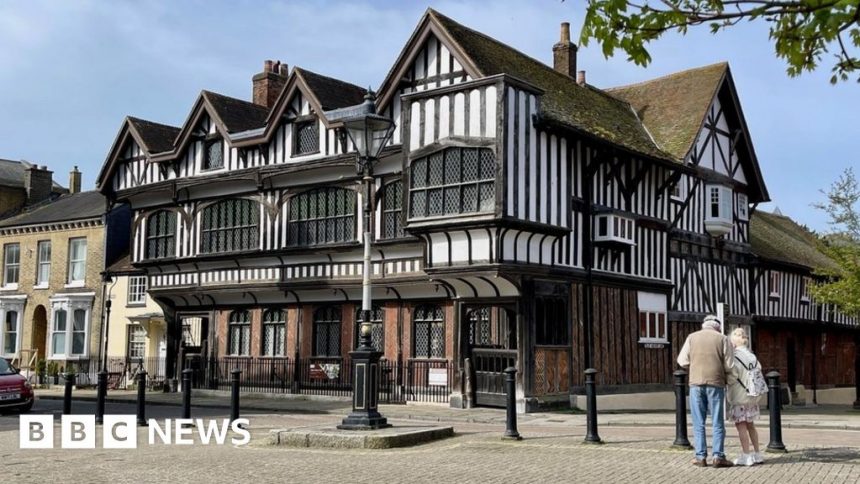The councils selling the family silver to pay bills
-
Published

Councils who are short of money are selling assets worth hundreds of millions of pounds to avoid falling into effective bankruptcy.
Car parks, land earmarked for new homes, and even galleries and museums are being offered for sale to meet short-term debts.
But others are refusing to cash in, even though they say they have never faced a more difficult financial crisis.
Labour-run Southampton City Council is aiming to raise £121.6m from sales of assets. The city’s 800-year-old Tudor House and Gardens is on the list, along with car parks, offices and art galleries.
Councillors want to give first choice to institutional purchasers who will keep property in the public sector.
The council is one of six granted what the government calls “exceptional” permission to break the golden rule of not meeting revenue shortfalls with cash from the capital account.
A spokesman for the Department of Communities said: “This is about having a pragmatic approach and agreeing financial flexibilities to help them balance their budgets and deliver vital services.”
Selling the family silver
But the idea of “selling the family silver” to pay debts isn’t popular everywhere.
Neighbouring Portsmouth, which is run by the Lib Dems, has a valuable collection of antique silver, used for formal occasions in the city’s historic Guildhall.
Among the historic items is the silver gilt Bodkin Cup from 1525, insured on its own for more than £1m.
Councillors of all political parties believe it would be “disrespectful” to sell items that are part of the city’s heritage. In many cases they were presented as gifts.
In Labour-run Oxford, councillors are keen to sell one particular piece of silver. A hunting trophy showing a trapped fox being held above the hounds has been hidden from public view for some years because it is thought to glorify animal cruelty. The Morrell Trophy is said to be worth £185,000.
The number plate of the Lord Mayor’s car – FS 1 – could make even more at auction. At the moment it’s thought to be worth ten times the Nissan electric car that it has been placed on.
Everything must go?
Dozens of other councils around the country are rummaging through the attic for assets to sell off, often in the teeth of local opposition.
Britain’s largest local authority, Birmingham City Council, is carrying out the biggest disposal of assets, as it struggles to get its finances back on track after effectively declaring itself bankrupt.
The Labour authority, which has been taken over by the government, is selling off a motorsport-themed adventure park to Birmingham City football club, which plans to build a new stadium on the land.
More controversially, it is planning to close many of its 35 public libraries and could also sell off of “heritage” sites, such as Sarhehole Mill, which inspired author JRR Tolkein, sparking a campaign against the cuts.
Thurrock Council, which until a budget dispute last month was Conservative controlled, is another local authority in deep financial trouble, after a failed investment in solar farms.
The council is lining up what the Tory group leader insists is not a “fire sale” of assets, including car parks, industrial estates and a former library.
In total, about 75,000 public assets, worth about £15bn, have been sold by English councils since 2010, according to research by the IPPR think tank.
Zoe Billingham, director of IPPR North, said: “Central government is leaving local government with no choice but to sell off assets that belong to the public.
“For communities across the country, it will not be clear why assets are being sold or how far these sales will go. This mass sell off will represent an irreversible loss to our public realm.”
She says the government should “heed the warnings of our local leaders and provide local funding that is proportionate to need and reflects rising demand and cost”.
Do people agree?
But why shouldn’t councils sell off antiques and other valuables they own if the public are not getting any benefit from them?
We tested how popular it would be among voters in Plymouth to find buyers for some of the city’s silverware.
Adam Strawbridge, 37, felt the city was right to hang on to the silver. “I think we should keep it because once it’s gone, it’s gone. You wouldn’t get rid of anything from the Mary Rose for instance or HMS Victory so why would you get rid of the silver from the city?”
Student David Oni, 18, said the council should work harder to publicise its historic wealth saying: “I don’t know if they value history over money.”
But 30 year-old Colleen Wilson felt the silver should definitely be sold. “There’s a lot of homeless people, people need places to live. It’s not doing anything. It’s just going to collect dust, isn’t it?”
In fact, over the last 10 years Portsmouth City Council has been spending millions on further assets designed to bring in revenue.
It gets a tidy income from £110m of property investments including a Waitrose store in Somerset and DHL warehouse near Birmingham.
The council would like greater freedom to make further commercial purchases, and perhaps sell properties whose revenue has fallen away.
But in contrast to the rival port of Southampton on the south coast, Portsmouth’s actual “family silver” is staying under lock and key, certainly not for sale.






